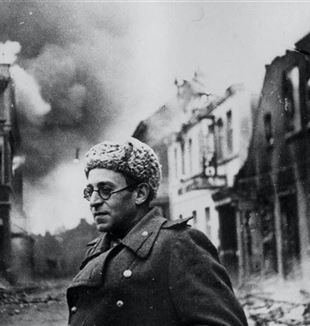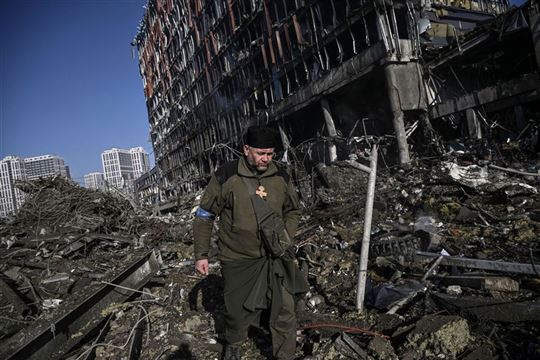
Grossman: "Violence always destroys homes"
War, the home and the self. This is a good time to re-read "Life and Fate" by Vasilij Grossman, who spent his youth in Berdyčiv, a Ukrainian city then part of the Russian Empire. Translated from the April issue of Tracce.I too am a character of Vasilij Grossman. I discovered him many years ago when I was home from school with a fever. I remember reading Life and Fate in succession, only stopping to eat and sleep. At a certain point, as was inevitable, I was totally immersed in the pages of the book.
I did not identify with any of his many characters: dozens and dozens of men, women and children whose destinies intertwine during the Second World War. Also featuring are Russian and German soldiers, airmen, prisoners in concentration camps and gulags, scientists, wives, husbands, lovers, criminals, professors, peasants, even Hitler and Stalin and other historical figures. I was none of them. Thanks to the prodigious effect of storytelling, I was all the characters I encountered but I was still myself, a teenager who had never known war or misery. In fact, what left me breathless was above all the dark power that almost overnight put an end to life’s habits, its dignity, even its humanity. As Dr. Sof'ja Osipovna Levintov thinks on the train taking her to the concentration camp: “Although the process of evolution had taken millions of years, these people had needed only a few days to revert to the state of cattle, dirty and unhappy, captive and nameless.” To be "nameless" was a condition that I could not identify with, but that I tried my best to understand.
A few days ago I picked up Life and Fate again; once again, curiously, whilst I was sick. Grossman once again spoke to me of "impossible" situations, such as the interior of a gas chamber and the death of prisoners, narrated from their point of view. But at the same time, page after page, I realized that I was also acquiring a more lucid gaze at current events, at the ongoing war in Ukraine.
The author, Vasilij Semënovič Grossman (1905-64), an engineer by training, then a journalist, war reporter and writer, spent his youth in Berdyčiv, a Ukrainian city then part of the Russian Empire. He finished writing Life and Fate in 1959; the novel, rejected and confiscated by the Soviet regime, fortunately got to Europe and was published for the first time in Switzerland in 1980. What can a story deeply rooted in the 20th century say about current events?
To begin with, it can teach us to look at the heart of events. I am not talking here about the book’s geopolitical context or even its historical roots. Life and Fate can help with that as well, but I will leave that to experts. As an author and a reader, I recognize Grossman's genius and craft. The novel, so anchored in its time, sheds light on current news headlines as well. The underlying conflict is as old as humanity: violence, with its ability to distance us from ourselves, to shatter our "I", is opposed to freedom, which is precisely the recognition of our value, our uniqueness. As Ikonnikov, a prisoner in a concentration camp, says: "Where acts of violence are committed, sorrow reigns and blood must flow". Therefore, Ikonnikov rejects any kind of violence, including violence for justice: "Condemn the sin and forgive the sinner", he often repeats, quoting "a Christian author of the fourth century".
Violence, in the novel, is not only caused by military force, but is also the evil that pervades simple people. As the letter from the Jewess Anna Semenova shows, describing the persecutions against the Jews: "The caretaker’s wife was standing beneath my window and saying to the woman next door: ‘Well, that’s the end of the Jews. Thank God for that! What can have made her say that? Her son’s married to a Jew. She used to go and visit him…”
Two powerful symbols strike me: the empty house, destroyed by bombs, and the restored, rebuilt house. Even today, looking at the images coming from a country at war, that image of the ruined house is striking as it implies the rupture of everyday life: living together, recognizing that it is when our ‘I’ is welcomed in a home, real or ideal, that makes us free and fulfilled human beings. Violence, on the other hand, from inside or outside, always destroys homes.
There are numerous references: from the expression "hiding away one another’s things", by which the Jews refer to the emptying their homes before they are expropriated, to the multitude of refugees of all nationalities, and the bombed houses. Librarian Musja Borisovna captures the moment when daily life is about to descend into chaos: "The window of her room looked out onto the barbed-wire fence that surrounded the ghetto (...) The moonlight, the cadenced and majestic movement of the armoured units, the powerful black trucks, the timid ticking of the pendulum clock on the wall, the stockings, bra and blouse that seem to have frozen on the chair – everything most incongruous had fused together."
Another of his characters is tormented by love, who is described as: "He was on fire – just like a house. The beams had given way. The ceiling was falling in. Cups and plates were crashing to the floor. Cupboards were toppling over. Books and pillows were tumbling about, flying through the smoke and the sparks like birds…” There is an elderly woman who does not want to leave her destroyed home: "The wall facing the street was still there. Through the gaping windows, her farsighted eyes could make out the light blue and green walls of her flat. But the rooms had no floors or ceilings and there was nothing left of the staircase. The bricks had been darkened by flames; here and there they had been scarred by splinters.”
The house is also a sign of resistance. In the midst of a terrible situation, the girl "thinks back to the plaque on the door of her house"; the peasant woman who welcomes a dying former prisoner into her hut; the very image of the hut used to represent the irreducibility of the ‘I’ - "Among a million Russian huts you will never find even two that are even identical. What is alive has no copies." Violence eradicated precisely this difference, this freedom to be what we are, and thus assimilates people into the collective idea of "us" against "the enemies". However, the symbol of the house is linked to hospitality, to the ability to distinguish the other individually in order to welcome them.
The scene in which Captain Novikov flees the war for a moment to visit the woman he loves is interesting. While describing the residence in which Zenja finds himself, the narrator sketches out some of the traits of woman's solid and complex character: "It was an old two-storey house, one of those obstinate buildings that never quite keep up with the seasons; it felt cool and damp in summer, but its thick walls retained a close, dusty heat during the autumn frosts." Finally, even the house of the old Aleksandra Vladimirovna is ready to find an identity: "It was still dark, it was cold, but very soon doors and windows would open wide and that house would come back to life, filled with laughter and children's cries, with the hurried steps of a woman and the determined ones of the landlord."
Read also - Canada: "My drawings for my Ukraine"
There is no difference between one war and another, between one prison camp and another, between Nazi and Soviet hatred. It is always about breaking lives and demolishing homes, without regard for individuals, because totalitarian thinking lies behind every offensive war. But fortunately "man’s innate yearning for freedom can be suppressed but never destroyed. Totalitarianism cannot renounce violence. If it does, it perishes. Eternal, ceaseless violence, overt or covert, is the basis of totalitarianism. Man never voluntarily renounces freedom. And this conclusion is the beacon of our age, a beacon lit on our future."
What role does reading or rereading Life and Fate thus play? The novel itself provides an answer: "Only when he recognizes in others what he has already grasped within himself does man savor the joy of freedom and goodness." In other words, it is a matter of finding the peace one desires for others within oneself. It is not a spontaneous process: this house, like all houses, requires effort, patience and, above all, the ability to work together.